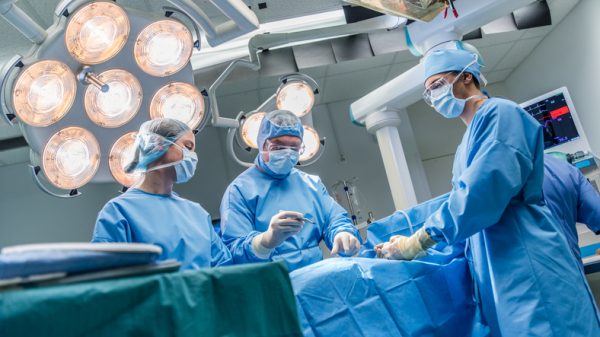
Your Definitive Guide To Joint Replacement Surgical Procedure
Joint replacement surgery can enhance the quality of life by providing enhanced mobility and reduced pain for life.
Did you know there are more than 7 million people who have had this joint replacement procedure done?
There have been remarkable advances made in technology, and as a result, it has transformed joint replacement surgical procedures into reliable and efficient surgical procedures.
Before getting this surgery done, one must always remember, results are not always indicative, typical, and representative for all patients. Results usually vary from one person to another due to different variables such as weight, health, and everyday activity. Not all patients are a candidate for the joint replacement procedure. Only an orthopaedic doctor can recommend if this treatment is appropriate for a candidate’s specific health condition or not. The best orthopaedic hospital in Chandigarh will suggest a person with guidelines on proper post-operative activities and restrictions, which usually varies from one person to another.
Suppose you have a joint-related problem, which is now limiting your everyday activities and causing a lot of pain. In that case, it is the right time to talk to an orthopaedic doctor about whether this joint replacement surgical procedure is suitable to treat your health problems or not. Also, ask your prospective surgeon about the risks involved in this surgical procedure and the total period it takes to recover from it.
Usually, patients have a lot of questions roaming in their minds about this joint replacement procedure. Here, we have listed some of the frequently asked questions along with their answers. Please read them and stay informed about different aspects of this surgical procedure.
What happens in a total hip replacement surgical procedure?
In it, the arthritic ball of the upper thigh bone plus the damaged cartilage is replaced. Usually, the arthritic ball is replaced with a metal ball to make a new and smoothly working jointly.
What is a partial knee replacement surgery?
Often, there comes a case when only a single of the knee is worn-out, while other parts work fine. In those specific cases, only the affected part is replaced through a plastic or metal implant. These surgeries are mostly done with smaller incisions, and one may recover from it quickly.
What is arthritis?
According to healthcare professionals, there are more than 100 types of different arthritis that can affect a person. However, the most common among them is osteoarthritis. In this condition, cartilage usually starts to wear away, resulting in bone-to-bone contact that causes unbearable pain.
Will you have any restrictions following the joint replacement surgery?
Yes, of course, you will be restricted from doing certain high-impact activities like cycling, running, playing football, cricket, basketball, and tennis. In addition to this, you will also be restricted from skiing and playing contact sports. Too often, hip patients are prohibited from crossing their legs and bending their hips to more than a 90-degree angle after surgery.
Do you need help at home following a joint replacement surgical procedure?
Yes, if you go home following surgery, you are going to need help with house cleaning, meal preparation, going to the washroom, having a shower and stairs in the first week or so, depending on how quickly you are getting recovered.
How are the results of joint replacement surgeries?
Well, the results of these surgeries have been excellent in 97% of cases. However, end results vary from one person to another, depending on the severity of the problem, the quality of surrounding tissue, a patient’s activity level, recovery, and adherence to the surgeon’s guidelines.
What are the risks involved in joint replacement?
Complications can happen during and after the surgery. A few complications include, however, not limited to blood clots, infection, blood clots, malalignment, and nerve breakage. There could be a case when any of these conditions may require additional surgery by a surgeon. Too often, to avoid any such instance, orthopedic surgeons recommend blood thinners and antibiotics before and after the surgical procedure is done. Even though these joint replacement surgeries are successful in maximum cases, few experience stiffness and pain. In order to avoid any such thing with you, it is recommended to discuss these risks with your orthopedic surgeon beforehand.
Is therapy required after joint replacement surgery?
Of course, yes, a therapy supervised by the best physiotherapist in Chandigarh is always required for many months after any joint replacement surgical procedure is done. Special splints are usually used depending on a person’s health condition and how the surgery was done.
Joint Replacement Surgery At ARV Hospital Chandigarh
ARV Hospital Chandigarh is one of the best orthopedic centers for treating bone and joint-related problems. Their wealth of knowledge and wide-ranging expertise in orthopedic make them offer the best level of services for joint pains, sports injuries, and other common orthopedic problems. The best part about them is they are equipped with world-class infrastructure and advanced technologies to treat a variety of joint-related problems with utmost care. The facilities and expertise offered at their hospital make them one of the best orthopedic hospitals in Chandigarh.
If you are experiencing any joint-related problem but not sure how to proceed further and from where to seek medical assistance, feel free to contact the ARV hospital team and get your problem treated with utmost care and satisfaction by real professionals.
Got any questions and concerns regarding any orthopedic treatment and surgical procedure? Write a line to us or contact our experts directly and get assistance for yourself and your beloved one.